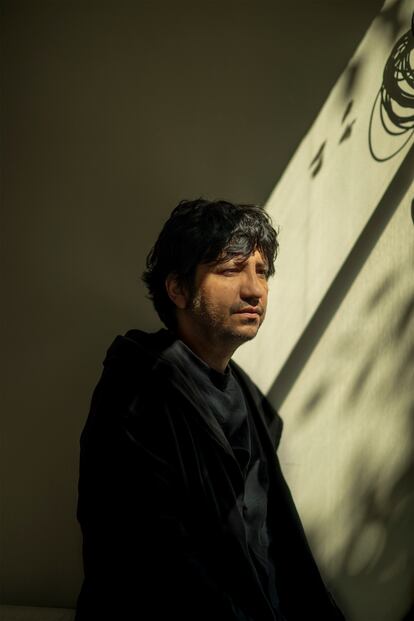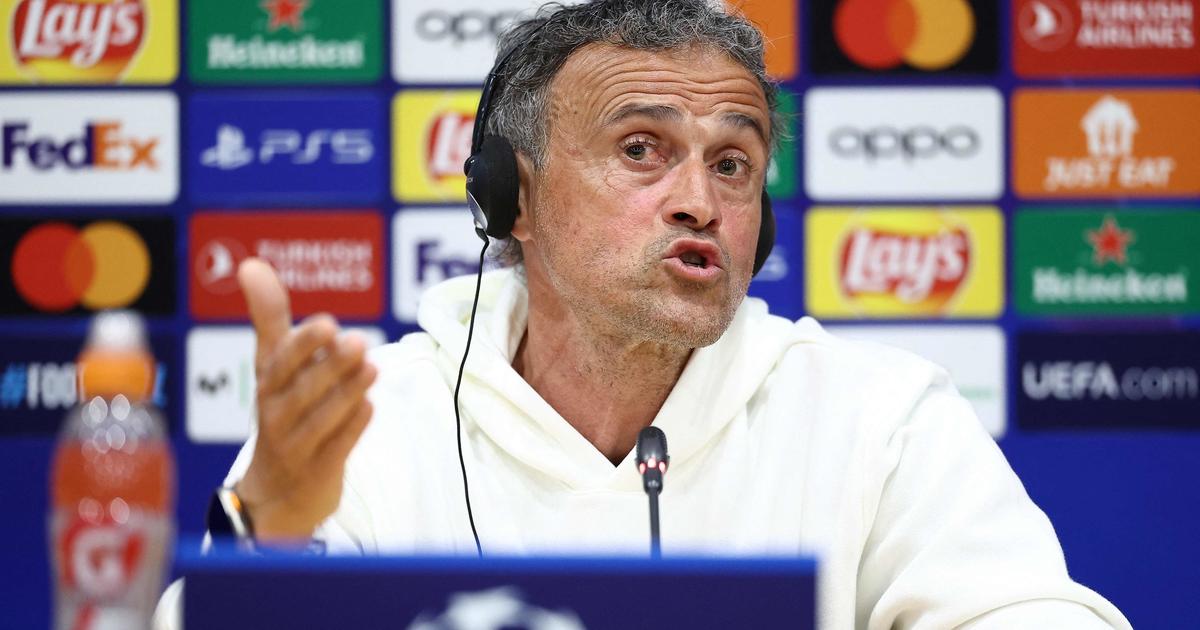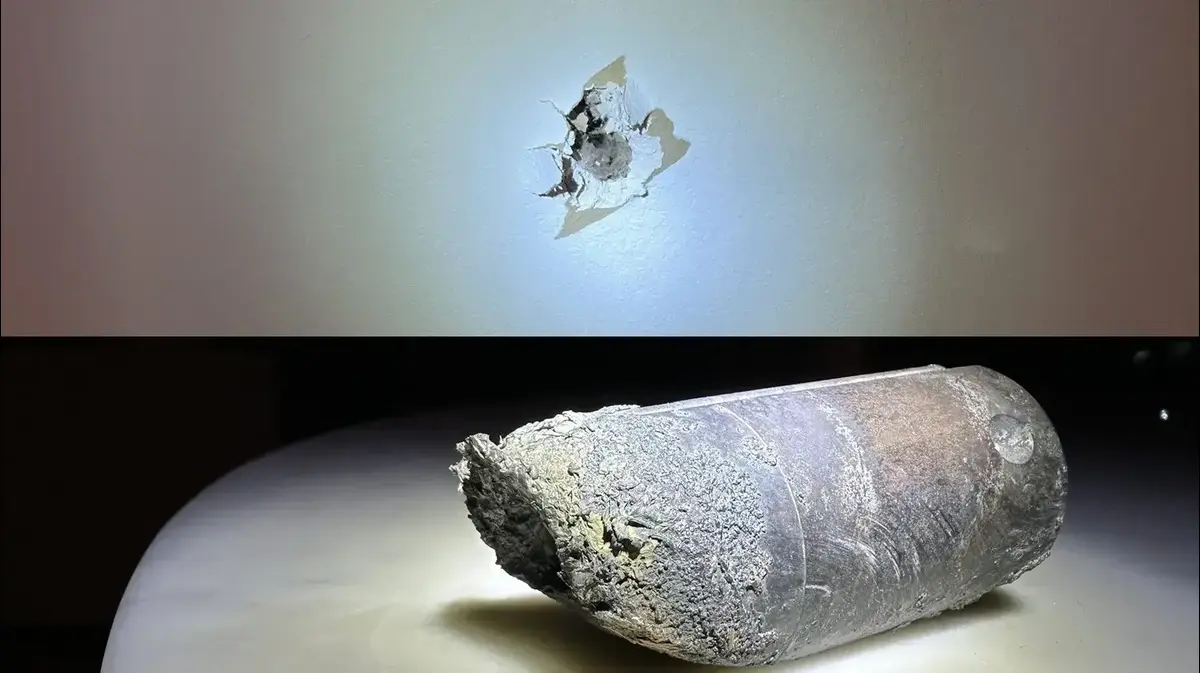Alejandro Zambra (Santiago de Chile, 1975) asks us to talk in a hotel. Coffee after coffee, we spent three hours on the roof of Habita in Mexico City. He may appear shy, he seeks to be precise. He answers by resorting to his novels —
Forms of returning home, Bonsai, The private life of trees
or, most recently,
Chilean Poet
—. He seems to want the interview and avoid it at the same time. Play multiple answers as he did in his impressive
Facsimile,
the university entrance exam in which, among possible answers, one learns what history could have been or how it can be manipulated.
He says that he lives next to the Chapultepec park with the writer Jazmina Barrera and her three-year-old son Silvestre.
He works, like his characters, in a small room on his roof.
He jokes about being the interviewer.
"I am uncomfortable with the assumption that one should say important things."
Does everyone have the right to be forgiven?
In theory, yes.
Hating is a job that you can't get out of.
But I know many people whom it would be absurd to forgive.
I am against the death penalty, but if we are faced with pure evil it is very difficult to conceive the idea of forgiveness.
I don't think victims should be asked to forgive.
But it is important what happens to them with that forgiveness, the reparation arises from a liberation of the trauma.
I can hate Pinochet and leave him in a bubble.
What is the use of hating?
It is no use feeding hatred with an informed and chicken sentiment.
You have to do something with it.
Otherwise, he harms the one he hates.
In
Chilean Poet
, the compulsive pregnant grandfather generates contempt linked to the mother's discomfort, but also challenges the idea of the masculine.
Men have a hard time arguing from gender because we never had to reflect as a group and the current moment equates men who have nothing to do with it.
Some reacted by imitating the father and others took the father as a countermodel, which is my case.
Its protagonists are poets or literature professors.
Won't people get tired of reading stories about writers?
Same yes.
Writing is democratic.
It's paper and pencil.
It does not seem to require any learning that of course it requires.
But there are novels like
Family Lexicon,
by Natalia Ginzburg, or, in our case,
Ways to Return Home
that we could all have written by experience, not by ability: the easiest books are the most difficult to write.
He undergoes a thorough self-observation.
When writing appears the desire to remember accurately.
And at the same time the mistrust in everything you remember.
That, which may sound somewhat tortuous, seems precious to me.
The benefit that I have been able to achieve with writing has to do with rethinking.
His work goes from the controlled perfection of the first stories...
To the total imperfection of
Chilean Poet.
Do you see the self-demand?
It is as if he had decided to humanize himself.
It's not that he let me go, it's that I got stupid.
"Growing up is learning to tell your story as if it didn't hurt"?
I don't believe in maturity because of what it definitely has.
It may seem that a book freezes movement, but I like what I like about literature as Freud: that the story never ends.
He has written normally about the Chile that preferred not to see who
Pinochet was.
For me, it was important to go from when your story was told through your parents to the moment when you tell it yourself in relation to the people you choose as a new family, whose pain you make your own despite not having felt it.
That is a step for collective mourning because there is the vice of expressing history according to one's experience.
"While the country was falling apart, we were learning to fold a napkin into the shape of a ship."
The one who looked the other way was the most widespread Chile?
It was a repressed Chile in every conceivable way.
A great triumph of the dictatorship was to make us think that we ourselves were not victims when we grew up in a completely intervened world.
The obsession of the Pinochet dictatorship was not to look like a dictatorship.
He himself spoke of “dictablanda”.
How was your childhood?
On the outskirts of Santiago.
In new houses, on streets with fancy names.
I lived in Aladdin with my father, my sister and my mother.
My impression of adults was that of boring people who spoke little and did not seem interested in building relationships with others.
Middle class?
An emerging class.
The gringos categorize: those who are going up and those who are going down.
They went up.
My dad worked his entire childhood.
He was poor and his great challenge was to finish school.
A self-imposed challenge because what he lived in his community was that finishing school was almost an eccentricity.
He got it when he realized he couldn't be a professional footballer.
It was good?
Very good archer.
I saw him play.
At the age of 17, he learned that there was a thing called computing and that there was an institute where if you were the best one month, the next was free.
He had never been the best.
But there was an opportunity there.
He finished his degree and met my mother.
If you describe a childhood of silence, who has told you this?
It was not a permanent silence.
The relativization of the political position has to do with that: tomorrow you have to go to work the same way.
That is the silence that I knew.
"My mother was a device that turned songs from the left into songs from the right."
Was surviving silent?
What does it mean that my mother sang a song by Violeta Parra?
Any.
And all.
The music was always there.
Didn't know what he sang?
You sing without knowing
Billie Jean
is a horrible song that defends irresponsible parenting.
We danced it and it seemed like it was good.
Being a kid was fun.
I was on the street all day.
For some reason it felt like the villa was a safe space.
It is paradoxical in light of the revelation of thousands of abuses perpetrated by the Catholic Church.
Why did they think the children were safe?
I think because we played.
There was the chronic insecurity of the world forever, but nothing specific.
It was always like that, I guess horribly.
My parents didn't talk to my friends' parents.
They greeted each other cautiously so that the other wouldn't know who you were.
Trust was related to the familiar.
In
Facsimile
an exam question is: what is silence?
Complicity, prudence, companionship.
We are not going to come to a single answer.
Over the years you begin to understand that silence fulfilled several functions.
And it is difficult to distinguish silence from silence.
What part was the silence with which they believed to protect you.
What part pure repression and what part an indirect protection of not wanting to influence what you think.
Nobody in my family was telling us what to think.
That not giving an opinion had a mark, of course.
How did you decide where you were from?
For a desire for independence.
He wanted to establish fun bonds, to laugh.
I was always social.
And not shy?
Not that much.
In the literary space I feel comfortable because its origin is an introspection.
I separate writing from publishing.
Publishing is always a strategic, vain decision.
What drives you to post?
Feeling that it is no longer mine.
Or to think that something may have a shock interest.
What have you learned as a father?
I remember having him in the rocking chair, leaning against his chest, and thinking: They did this for me.
That leads you to notice what we forget.
If childhood amnesia did not exist, any form of rebellion would be impossible.
How are you going to rebel against the person who changed your diapers?
You are forgetting and an injustice grows when judging.
It is very necessary because, if it did not exist, there would be no way to live.
"Men have a hard time discussing from the gender because we never had to reflect as a group," says Alejandro Zambra.Ana Hop
He has been a stepfather and a father: "The overwhelming joy of being important to someone."
I can't say anything smart about that.
But that phrase is expressed by a character who stops being a father because he separates from the child's mother.
There is no word for a stepchild of divorcing parents.
I very much respect the decision not to be a father.
Adoptive parenting makes perfect sense, but what is biological parenting?
Tradition?
In my case it has been chosen and late, very different from that of the generation of my parents or grandparents, which was something that happened.
It's hard for me not to link it to the recovery of the sacred, something that really changes you.
Why did you want to be a father?
It had to do with the recovery of the love of a couple, with the desire of the collective.
And with falling in love with the possibility of going beyond oneself.
He asks: "What's the point of being with someone who doesn't change your life."
Beyond love, I lead a life closely linked to my friends, people who will listen to me and will accept that I say nonsense just as I will admit theirs.
An encounter with yourself makes encounters with others more fulfilling.
When you manage to talk to yourself a little bit, you no longer blame others so much for everything that happens to you.
When did you get it?
Too small.
In my childhood, my maternal grandmother was also determined that her grandchildren write.
She had lost her entire family in the 1939 earthquake. She had gone to Santiago and met a handsome man, Chucheta.
His grandfather, the seducer.
That he had abandoned her with three children.
She sold everything.
And I knew her as a great character: a singer and storyteller that was difficult to listen to because they had all died in the Chillán earthquake.
In the middle of a funny story she would remember something and she would start crying.
I never saw her with a book in her hands.
How many earthquakes have you experienced?
Big, three: 1985, 2010 and 2017 here, in Mexico.
And I remember everything.
Small problems disappear and you live what solidarity is.
It is almost the opposite of the pandemic.
It has an immediacy that lends itself to giving your best.
Didn't your grandmother talk about politics either?
Never.
That disorients you, you have external information that you don't know how to react to.
"In my family there were neither dead nor books."
It's very fucked up.
One cannot own the pain of others.
That is why my first books have to do with the legitimacy of pain.
Did you blame your parents for keeping quiet?
Higher.
In a fight they would tell you that they protected you.
That you have no idea what it was like to queue for milk and it's a good thing you're so free to judge them.
One at the beginning retells his story from the need to show that his position is different from theirs.
Then, when the character has already been divorced and has lost a family, it is no longer so clear to him that going back is going back to his parents' house.
Then he says that it is not in his novels.
I can't deny that I wrote them.
But I hate the arrogance of the interview situation.
It's a cult of personality that doesn't interest me.
I understand the contradiction.
But as a reader I don't care if the texts in the first person have happened or not.
I do not seek to clarify your books.
I seek to understand who you are.
There are poems in which, without understanding what they are talking about, you feel that they are saying something that you needed to be said.
That can also happen in an interview.
He blamed the silence of his parents.
You spoke?
Writing is that.
My resistance to interviews has to do with the fact that there is too much self-flagellating and defensive speech.
“When you manage to talk to yourself a little bit, you no longer blame others so much for everything that happens to you,” says the Chilean writer. ANA HOP
"Tips for being a poet: be passionate, interesting, maybe a little fragile, without fear, someone who bets on his feminine side."
Humor allows you a healthy distance from yourself.
Being self-demanding makes an ode to imperfection.
Sure, I wasn't someone who could afford to think about repeating a grade.
But it is a type of success.
Very few authors are translated in the US.
I don't like how victory is faced in public discourse because in Chile, moreover, if you're doing well they don't ask you.
They confirm: it has gone well for you, eh… As if it were unfair.
In Spain it seems to me that it is the same.
I'm afraid similar.
The satisfaction of writing four hours a day is the achievement I have achieved.
I left as a Sunday writer.
Writing is something you always have to be justifying.
He talks about lying to appear better, out of fear, to please, to hide.
Is he a liar?
Do you want me to tell you the true? When in doubt, I lied, Borges wrote. I think that the desire for truth leads you to think a lot about imposture. Generationally, collective lies were fabricated, like those who said they had read Proust. It is the dictatorship of experience. Everyone has to have lived to be able to speak. Our parents used that disqualification: "You didn't live it, you don't know what that was like." And those of us who dedicate ourselves to literature do something similar: "You haven't read Proust, you haven't read anything." That's why people invent. Many times you lie out of the desire to please another. No one has read it all. We were a university generation raised without libraries who became interested in literature almost as a diversion. We didn't write books like the ones at home because there weren't any at your house.Which is not a disadvantage. I was not a reader of library books. I read poetry and library classics.
In Chile they had a poet and an antipoet
.
Neruda and Parra, the yin and the yang: the solemn and the anti-solemn.
Where would Gabriela Mistral be?
Now in a central place.
When I was a kid, on the 5,000-peso bill and in children's poems.
His work was revalued, which is difficult.
But they didn't even dare to say that she was a lesbian.
Nor did they say that Neruda was a misogynist.
Today Yes.
We feel like killing great-great-grandfather.
Parra, on the other hand, is essential for me.
Have some poets done harm?
Benedetti has never interested me.
Maybe because I associate it with a wall.
Let's Make a Deal
was on a craft fair scroll at my house.
His method of being in the world has been to "hold on to two or three things you know and leave the conquest of true wisdom for tomorrow."
That sufficiency was closely linked to the school where I studied for the last six years, to a supposed social ascent that sought academic excellence under pressure.
We were kids whose parents hadn't gone to college and, in theory, we were going to go.
The first thing we learned was that the world was a ruthless place and we had to save ourselves.
We grew up convinced that there were no second chances.
Then I have dedicated myself to fighting that in myself.
Writing is building a semi-utopian space in which your relationships are more fun, more intense and have less to do with money.
Writing in Latin America is a search.
In Spain, one more market.
My way of regaining freedom was to write.
Sign in to continue reading
Just by having an account you can read this article, it's free
RegisterLogin
Thanks for reading THE COUNTRY



/cloudfront-eu-central-1.images.arcpublishing.com/prisa/QX7L2WYUWRGS5DVYIB6AL73EIA.jpg)








/cloudfront-eu-central-1.images.arcpublishing.com/prisa/KMEYMJKESBAZBE4MRBAM4TGHIQ.jpg)


